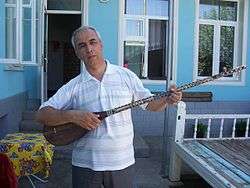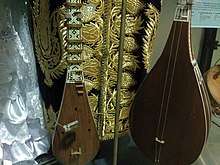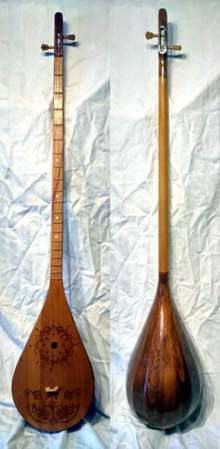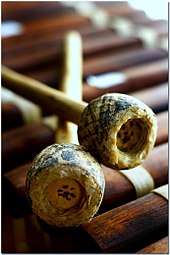Dutar
The dutar (also dotar; Persian: دوتار, romanized: dutâr; Tajik: дутор; Uyghur: دۇتتار, ULY: Duttar, USY: Дуттар ; Uzbek: dutor; simplified Chinese: 都塔尔; traditional Chinese: 都塔爾; pinyin: Dōu tǎ ěr; Dungan: Дутар) is a traditional long-necked two-stringed lute found in Iran and Central Asia. Its name comes from the Persian word for "two strings", دوتار do tār (< دو do "two",تار tār "string"), although the Herati dutar of Afghanistan has fourteen strings. When played, the strings are usually plucked by the Uyghurs of Western China and strummed and plucked by the Tajiks, Turkmen, Uzbeks. Related instruments include the Kazakh dombra. The Dutar is also an important instrument among the Kurds of Khorasan amongst whom Haj Ghorban Soleimani of Quchan was a noted virtuoso. In Kurdish one who plays the dutar is known as a bakci (bakhshi), while in Azeri the term is ashiq. Khorasan bakhshi music is recognized on the Representative List of the Intangible Cultural Heritage of Humanity.
 An Uzbek dutar player. | |
| Classification | |
|---|---|
| Related instruments | |


At the time of the Dutar's humble origins in the 15th century as a shepherd's instrument its strings were made from gut. However, with the opening up of the Silk Road, catgut gave way to strings made from twisted silk imported from China. To this day some instruments still feature silk strings, although nylon strings are also commonly used.[1][2][3][4]
The dutar has a warm, dulcet tone. Typical sizes for the pear-shaped instrument range from one to two meters.
Notable players
- Turgun Alimatov (1922–2008)
- Abdurahim Hamidov (1952–2013)
- Haj Ghorban Soleimani (1920 – 2008)
- Alireza Soleimani (Aliabad, Khorasan)
- Sultan Reza Bakci (Geliani) (Khorasani)
- Haj Mohammad Hossein Yeganeh (Khorasani)
- Saied Tehranizadeh
- Abd Allah Amini (Khorasani)
- Zolfaghar Askarian (Khorasani)
- Gholam Ali Poor Ataa (Khorasani)
- Aliia Gholi Yeganeh (Turkmen)
- Abdurehim Heyit (Uyghur)
- Osman Mohammadparast (Khaf, Iran)
- Abdollah Alijani Ardeshir (Tehran, Iran)
See also
References
- https://shahnameh.netlify.com/dutar.htm The Shahnameh Guide To The Lutes Of Central Asia
- https://instrumap.netlify.com/asia.html Instrumap collection of stringed instruments: Asia
- https://stringedinstrumentdatabase.aornis.com/d.htm The Stringed Instrument Database: D
- https://atlasofpluckedinstruments.com/central_asia.htm ATLAS of Plucked Instruments: Central Asia
External links
| Wikimedia Commons has media related to Dutâr. |
- Listen famous Dutar tunes
- Encyclopedia of Persian Music Instruments
- Dutar Music of Turkmenistan (ethnomusicology essay by Graham Flett, 2001)
- Youtube video of dutar music
- Picture of a Dutar
